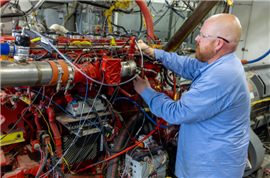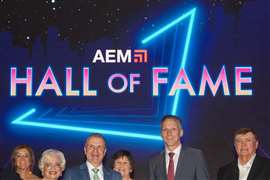Read this article in Français Deutsch Italiano Português Español
SwRI turbocharges its H2-fueled ICE
25 November 2025
Southwest Research Institute (SwRI), an independent, nonprofit, applied research and development organization based in San Antonio, Texas, has been actively working on the development of a heavy-duty internal combustion engine (H2-ICE). Now, it has announced the upgrading of its engine with a state-of-the-art turbocharger.
 SwRI has a multidisciplinary team dedicated to Hydrogen Energy Research initiatives, such as the H2-ICE. (Photo: Southwest Research Institute)
SwRI has a multidisciplinary team dedicated to Hydrogen Energy Research initiatives, such as the H2-ICE. (Photo: Southwest Research Institute)
In 2023, SwRI converted a traditional natural gas-fueled internal combustion engine to run solely on hydrogen fuel with minimal modifications. It was integrated into a Class 8 truck as part of the institute’s H2-ICE project to demonstrate a cost-efficient hydrogen-fueled engine as an option for zero-tailpipe carbon dioxide (CO2) heavy-duty transportation.
Hydrogen engines often struggle to maintain the airflow necessary during fast acceleration to eliminate preignition and minimize NOx emissions. SwRI said it has addressed this challenge by working with a commercial supplier that engineered a new turbocharger to SwRI’s specifications. The turbocharger shaft is mechanically linked to the crankshaft through a variable drive, allowing it to provide the necessary boost pressure on-demand.
The new turbocharger unit increases the truck’s performance by increasing peak torque from 1,494 to 1,760 lb.-ft. and peak power from 370 to 440 hp. Modern long-haul heavy-duty engines range from 1,450 to 1,850 lb.-ft. and range between 400 to 500 hp, SwRI noted.
“Upgrading this driven turbocharger gave us the airflow needed to continue improving the engine’s performance,” said Chris Bitsis, assistant director of SwRI’s Powertrain Systems Engineering Department, who oversees combustion research programs. “For instance, in addition to the torque and horsepower gains, the engine’s peak efficiency has also improved to 44.0%, which is class-leading for a spark-ignited engine.”
Bitsis said the torque and power ratings of the engine are now comparable with diesel trucks currently on the road while enabling near-zero tailpipe emissions.
“This is a significant milestone in the history of SwRI’s hydrogen combustion engine program and provides further evidence of the technology’s readiness,” Bitsis said. “We are excited to continue pushing this technology forward for a sustainable future.”
The Class 8 demonstration vehicle was developed as part of SwRI’s H2-ICE consortium. The consortium’s completed Class 8 H2-ICE demonstration vehicle is designed to offer the long-haul trucking market another zero-greenhouse gas option.
“I am proud of our team at SwRI for demonstrating that there is a high efficiency, zero-emission transportation solution available to help reduce CO2 and criteria pollutants,” said Daniel Stewart, Vice President of SwRI’s Powertrain Engineering Division. “The U.S. has the engine factories and supply chains necessary to put this technology into production today.”
POWER SOURCING GUIDE
The trusted reference and buyer’s guide for 83 years
The original “desktop search engine,” guiding nearly 10,000 users in more than 90 countries it is the primary reference for specifications and details on all the components that go into engine systems.
Visit Now
STAY CONNECTED




Receive the information you need when you need it through our world-leading magazines, newsletters and daily briefings.
CONNECT WITH THE TEAM













